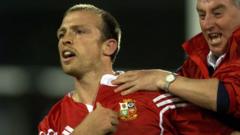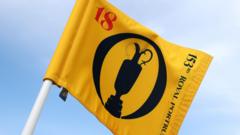Is Dawson's 2001 Lions Diary a Tale of Trouble?

Understanding the Controversies of the British and Irish Lions Tours
The British and Irish Lions have a storied history that intertwines with some of the most dramatic moments in rugby union. Among the most notorious controversies are those that emerged during the 2001 tour of Australia, where former England scrum-half Matt Dawson found himself at the center of a media storm. This article delves into Dawson's experiences, the implications of his actions, and the broader context of controversies that have marked the Lions' tours over the years. By exploring these moments, we aim to provide a comprehensive understanding of the dynamics within the team and the impact of individual decisions on collective morale.
Matt Dawson's Diary: A Catalyst for Controversy
During the 2001 Lions tour, Matt Dawson wrote a diary for the Daily Telegraph that would ultimately lead to one of the most talked-about incidents in Lions history. His candid comments about head coach Graham Henry stirred the pot, as he criticized the lack of inspiration and the perceived strictness of the coaching staff. Dawson's reflections were not merely the musings of a disgruntled player; they were a raw look into the psyche of a team grappling with expectations and pressure.
The Regretful Reflection
In hindsight, Dawson expressed deep regret for his comments, acknowledging that his actions were petulant and unnecessary. "I was so far up my own backside," he said, highlighting the immaturity he felt in retrospect. This candid admission offers valuable insight into the human aspect of professional sports, where emotions often run high.
Backlash and Consequences
Upon the publication of his diary, Dawson faced immediate backlash. His criticism of the management team created a divide in the camp, leading to a conversation with Graham Henry that would define his tour experience. Henry's response was both frank and revealing, as he conveyed that he, too, was struggling with his role as a coach. This moment of honesty between Dawson and Henry could have been a turning point, yet the fallout from the diary loomed large.
A Near Departure
As tensions escalated, Dawson’s place on the tour came into question. He was informed that he might be sent home due to the "unacceptable" nature of his comments. The intervention of Lions captain Martin Johnson proved crucial. Johnson advocated for Dawson, arguing that while his actions were wrong, the team needed him. Ultimately, Dawson remained with the squad, albeit with a hefty fine of £5,000 for his indiscretion.
Team Dynamics and Leadership
Dawson's experience reflects the complex dynamics of team leadership and cohesion. Leaders must navigate the fine line between individual expression and team unity. The influence of strong leaders like Martin Johnson is evident in how they can mediate conflicts and maintain morale. Johnson's leadership style, characterized by a mix of authority and empathy, played a pivotal role in keeping the team focused on their ultimate goal.
The Role of Media in Sports Controversies
The media plays a significant role in shaping narratives around sports events. Dawson's diary and its subsequent fallout reveal how press coverage can amplify internal conflicts and create external perceptions that may not reflect the team's true state. This phenomenon is not unique to rugby; it is a common thread in many sports. Understanding the influence of media can help players and coaches better prepare for the scrutiny that comes with high-stakes competition.
Other Notable Controversies in Lions History
The 2001 tour is not the only instance of controversy within the British and Irish Lions. Over the years, several moments have sparked debate and discussion among fans and analysts alike.
Brian O'Driscoll's Omission in 2013
In 2013, Brian O'Driscoll, a revered figure in rugby and Lions history, faced a shocking omission from the deciding Test match against Australia. Having captained the Lions in 2005 and been a key player in the 2009 series, many expected him to lead the team once again. However, coach Warren Gatland opted for a different strategy, selecting a Welsh center pairing of Jamie Roberts and Jonathan Davies instead.
The Rationale Behind Gatland's Decision
Gatland's decision was met with widespread criticism, particularly from fans who believed O'Driscoll deserved to be included in his final Lions appearance. However, Roberts defended Gatland’s choice, emphasizing the coach's focus on performance over sentimentality. Roberts noted that O'Driscoll's form was not at its peak during the 2013 series, which influenced Gatland's decision to prioritize a winning combination.
The Aftermath of O'Driscoll's Exclusion
The fallout from O'Driscoll's omission was immediate and significant. Social media erupted with fans expressing their discontent, and a "Justice for BOD" Facebook page gained a massive following. Despite the controversy, Gatland's strategy proved successful, as the Lions triumphed in the series, winning the third Test convincingly.
Implications for Future Tours
The controversies surrounding Dawson and O'Driscoll serve as critical learning points for future Lions tours. They highlight the importance of communication, both within the team and with the media, as well as the need for players to be aware of their impact on team dynamics. As rugby continues to evolve, understanding these nuances will be essential for maintaining team cohesion and achieving success on the international stage.
Lessons Learned
- Open Communication: Honest dialogues between players and coaching staff can prevent misunderstandings and build trust.
- Media Relations: Players should be educated on how their words can affect public perception and team morale.
- Performance Over Sentiment: Coaches need to prioritize player performance and team strategy over emotional ties when making tough decisions.
- Leadership Influence: Strong leadership can help navigate controversies and maintain team focus amid distractions.
Conclusion
The British and Irish Lions have faced their share of controversies, each with its own implications for the team and the sport as a whole. Matt Dawson's infamous diary entry and Brian O'Driscoll's omission in 2013 are just two examples that underscore the intricate relationship between individual actions, team dynamics, and media scrutiny. As the Lions continue to build their legacy, these lessons will serve as a crucial guide for future tours and the players involved.
As we reflect on these events, it begs the question: How can teams ensure that individual expressions do not undermine collective goals? The answers may vary, but the ongoing dialogue about leadership, communication, and performance will undoubtedly shape the future of the British and Irish Lions.
FAQs
What was the main issue with Matt Dawson's diary during the 2001 Lions tour?
Matt Dawson's diary criticized head coach Graham Henry and the management team, leading to significant backlash and discussions about team dynamics and media influence.
Why was Brian O'Driscoll omitted from the 2013 Lions deciding Test?
O'Driscoll was omitted due to concerns over his form and a strategic decision by coach Warren Gatland, who opted for a more familiar Welsh center pairing.
What role does media play in controversies surrounding sports teams?
The media can amplify internal conflicts and shape public perception, often influencing how players and teams are viewed by fans and stakeholders.
In light of these controversies, how do you think teams should balance individual expression with team unity? #RugbyUnion #BritishAndIrishLions #SportsControversies
Published: 2025-07-15 05:26:14 | Category: sport



